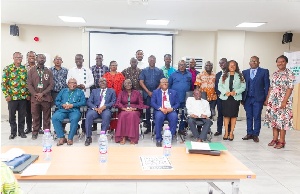- Home - News
- Elections 2024
- News Archive
- Crime & Punishment
- Politics
- Regional
- Editorial
- Health
- Ghanaians Abroad
- Tabloid
- Africa
- Religion
- Photo Archives
- Press Release
General News of Wednesday, 23 April 2025
Source: www.ghanawebbers.com
Ghana advances National AI Strategy with second consultation at KNUST
Ghana is taking an important step to finalize its Artificial Intelligence (AI) development plan.
Stakeholders from academia met at Kwame Nkrumah University of Science and Technology (KNUST). This was the second National AI Strategy Consultation.
The meeting followed an initial consultation with technologists and AI creators. It aims to involve academia in shaping Ghana's AI future.
The national AI strategy should be finalized by June 2025.
Elikplim Sabblah, Technical Advisor for GIZ’s FAIR Forward, highlighted productive discussions on the draft strategy. He emphasized GIZ’s commitment to supporting Ghana’s digital transformation.
Prof. Jerry John Kponyo leads the AI4SD Project and Responsible AI Lab (RAIL). He noted that AI could boost Ghana’s economic growth and support Sustainable Development Goals (SDGs).
He presented the strategy's mission, vision, and eight key pillars. Recommendations include launching an “AI-ready Ghana” program and expanding AI education.
Prof. Kponyo also suggested partnering with cloud providers. He stressed the need for stronger national data infrastructure and better data governance.
Plans are underway to establish a Responsible AI Office for ethical implementation of AI technologies.
RAIL is leading efforts for a comprehensive review of the National AI Strategy.
Dr. Arnold Karvaapuo represented Ghana’s Minister of Communication and Digital Technology, Samuel Nartey George. He described the strategy as a blueprint for Ghana’s digital future.
He outlined how AI can transform agriculture, healthcare, logistics, and financial inclusion. The government aims to make Ghana “Africa’s AI hub.”
He emphasized four priority areas: treating data as a national asset, enhancing computing power, building a digital workforce, and starting the 1 Million Coders program.
Johnson Masagotin Singir from the British High Commission reiterated UK support for Ghana's initiatives. He highlighted academia's role in fostering innovation and ethical discussions about AI.
Vice-Chancellor Prof. Mrs. Rita Akosua Dickson stressed developing an AI-ready workforce quickly. She announced an upcoming AI in Education Summer School in October 2025.
“This consultation gathers bright minds to create an inclusive strategy,” she said.
Darlington Akogo, CEO of MinoHealth AI Labs, discussed AI's economic potential. He estimated it could add $20 billion to Ghana’s GDP by 2030.
“AI offers higher returns than traditional assets like cocoa or oil,” he argued. He called for an urgent $500 million to $1 billion National Fund for AI development.
Stakeholders emphasized Inclusive AI that engages youth and Persons with Disabilities (PWDs). They also focused on capacity building through existing institutions.
Concerns were raised about ensuring data quality using local datasets. Ethical governance must balance innovation with regulation while preserving cultural heritage through technology.
A third consultation will involve the judiciary alongside public feedback on this "People’s Strategy" for national progress.











